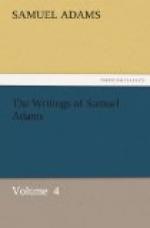TO JOHN ADAMS.
[Ms., Adams Papers, Quincy; a draft is in the Samuel Adams Papers, Lenox Library; the text with variations is in John Adams, Works, vol. vi., pp. 420-426, W. V. Wells, Life of Samuel Adams, vol. iii., pp. 308-314; cf. Department of State, Bureau of Rolls and Library, Bulletin No. 8, p. 16. Certain texts give the date as November 20.]
Boston Novemr 25th 1790
MY DEAR SIR
I lately received your Letter of the 18th of October.—The Sentiment, and observations contained in it demand my attention.
A Republic, you tell me, is a Government in which “the People have an essential share in the sovereignty;” Is not the whole sovereignty, my friend, essentially in the People? Is not Government designed for the Welfare and happiness of all the People? and is it not the uncontroulable essential right of the People to amend, and alter, or annul their Constitution, and frame a new one, whenever they shall think it will better promote their own welfare, and happiness to do it? That the Sovereignty resides in the People is a political doctrine which I have never heard an American Politician seriously deny. The Constitutions of the American States reserve to the People the exercise of the rights of Sovereignty; by the annual, or biennial elections of their Governours, Senators, & Representatives; and by empowering their own Representatives to impeach the greatest officers of the State, before the Senators who are also chosen by themselves.
We the people is the stile of the federal Constitution. They adopted it; and conformably to it, they delegate the exercise of the Powers of Government to particular persons, who, after short intervals resign their Powers to the People, and they will re-elect them, or appoint others, as1 they think fit.
The American Legislatures are nicely balanced: They consist of two branches, each having a check upon the determinations of the other: they sit in different chambers, and probably often reason differently in their respective chambers, on the same question— if they disagree in their decisions, by a conference their reasons, and Arguments are mutually communicated to each other: Candid explanations tend to bring them to agreement; and then according to the Massachusetts constitution, the matter is laid before the first Magistrate for his revision. He states objections, if he has any, with his Reasons, and returns them to the Legislators, who by larger Majorities ultimately decide. Here is a mixture of three Powers founded in the Nature of Man; calculated to call forth the rational Faculties in the great points of Legislation, into exertion; to cultivate mutual Friendship, and good humour; and finally to enable them to decide, not by the impulse of passion, or party prejudice, but the calm Voice of Reason, which is the Voice of God:—In




